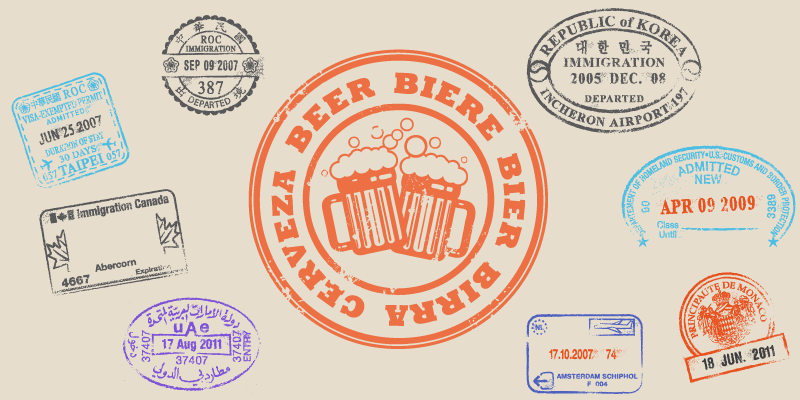Like people, some beers travel well, some don’t. When I was growing up in the U.K., my town had a brewery called Thwaites. It’s been around since 1807, so it’s fair to say they know how to make a good beer. I remember going on a tour of the brewery, located in the North of England, and being told that, not only did the beer taste good because of the brewing process, it tasted great because it “didn’t have to travel.”
Looking back, I always wondered whether that was true, or whether it was just a sales pitch from the brewery boss. But, as I later found on my jaunts around the world, the rich aromas, its piquant taste and depth of character was hard to beat, or when overseas, even match.
So, does local beer maintain a certain quality that beer that travels somehow loses along the way?
Cask ales–or cask conditioned ales–like the ones I drink when in Britain, are notorious for getting worse as they travel. When they depart a brewery, they are still ‘live’. They are living, breathing beers, they need to be stored at a very specific temperature, approximately 12 degrees Celsius, and moved gently. If the beer isn’t looked after, it can become quickly degraded in terms of taste.
Basically, cask ales are like fine bone china. Insofar as they don’t like being knocked around, they have to be treated with immaculate care, and they’re a bit fragile, so to speak.
But the life cycle of beer (and yes, it is genuinely living and will, eventually, die in terms of taste and quality) begins even earlier than that. How it’s cellared, tapped, and dispensed, these things matter too. Who knew beer making was so complicated?
So, what about travel time and air miles for beer? Does it affect the beer? Will it still taste the same, is it still the same beer? Well, not really.
Think of how you feel when you skip energetically off a short hop flight, compared to when you stagger off a long-haul journey, barely able to muster the energy to get to customs. Now think about your beer having the same sort of issues.
Cask ale generally becomes more watery and mediocre in taste when it travels (I’ve found that out the hard way). It loses it’s vigor and vitality, it changes on a chemical level. I like to think about my beer in the same way I consider meat; the less it has travelled, the better it will taste. Restaurants prefer local farm produce, pubs prefer local beer.
As a self-proclaimed beer acolyte, I can say that enjoying my local tipple further afield is notoriously difficult. On the positive side, it has led me to try local brews around the world that, had I been able to enjoy my local pint from back home, I may not have tried, so there’s always a silver lining.
As brewers like Shepherd Neeme, Fuller’s and Bass will likely tell you, as much as they’d love a bigger market share overseas, their beer just doesn’t travel as well as they’d like it to.
Why would a company that makes such wonderfully crafted beer risk someone tasting an inferior version of their product? I’ve met people who have tried an imported cask ale overseas, hated it, then refuse to try it when they visit the country where it is actually made. That’s the risk, a first impression can put you off a beer for good.
And it’s nothing to do with how it’s handled, it’s more of a chemical reaction or degrading issue.
It’s for that reason that Guinness brews in the U.S. rather than importing casks of their beverage from St. James’s in Dublin.* And it is precisely why, even though you can find bottles of Boddies, Bass, London Pride and Old Speckled Hen around the world, they never quite taste the same as they do in the U.K.
The same can be said of many Belgian beers too, but will this always be the case? It is hard to find a brewer who believes that cask conditioned ale travels well. Why do you think even the finest brewers ship in bottles, if at all?
I’ve been to plenty of food and beverage festivals, both in the U.S. and the U.K. and the imported drinks on show have often fallen short on taste. That is not to say these beers are not well made and incredibly tasty…when enjoyed closer to where they are brewed.
If the place you are imbibing has a brewery nearby (or, even better, an in-house micro-brewery), take the plunge. Your taste buds will thank you, closely followed by the appreciation shown by your stomach.
So, what can us beer drinkers learn from this? Well, several things.
Firstly, drinking local beers is a great idea, and not just because they haven’t suffered the taste trials of travel. Secondly, ask questions. When you go for a beer, ask the bartender what local brews they have. If I hadn’t done that, I would now be writing about the many times I had abused my taste buds with all kinds of generic beer mediocrity.
Thirdly, treating beer like wine, i.e. caring about the age and taste, is not being a beer snob. It’s no more snooty than caring whether your fruit is fresh.
In short, some beers travel better than others. If mass produced, bottled lager is your tipple, feel free to drink the same brand the world over. But if cask-conditioned ale, IPA or other ale are your thing, embrace the change, love the local.
*For the North American market Guinness Extra Stout is brewed in Canada. Guinness Draught — whether in keg, can or bottle — is imported from Ireland. This is not the case in other countries.

